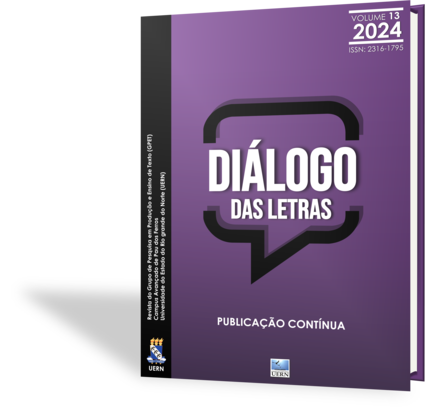Leitura e escrita no processo de alfabetização: o aplicativo GraphoGame na perspectiva dos novos letramentos
DOI:
https://doi.org/10.22297/2316-17952024v13e02427Keywords:
Leitura e escrita, GraphoGame, Novos letramentosAbstract
The use of apps in the acquisition of reading and writing in the literacy process can stimulate the development of skills and a taste for learning in an innovative way. Thus, this research is justified by the need to investigate the new literacies in the educational application GraphoGame, due to its importance in presenting new ways of learning to read and write in the Portuguese language literacy process. This study aims to analyze the GraphoGame application as a digital learning object (DLO) from the perspective of new literacies. The research is theoretically based on Araújo (2017), Lankshear and Knobel (2007), Leffa (2006), Rojo (2017), Rosa (2016) and Souza (2021), among others. The methodology adopts a qualitative approach, complemented by descriptive, documentary and applied research. The results show that GraphoGame is an alternative for incorporating games into the school environment, especially with people in the linguistic appropriation phase, contributing mainly to the development of phonological awareness, graphophonemic correspondence and decoding skills. As for the other aspects of the app: motivation and engagement, immediate feedback, personalized learning, multisensory support, preparation for independent reading and inclusion and accessibility converge more directly with the new literacies. We conclude that the GraphoGame app as a digital learning object from the perspective of the new literacies provides the manifestation of a new ethos and is inserted in a new mentality, constituting an educational and technological tool for promoting reading and writing skills in digital culture.
Downloads
References
ARAÚJO, N. M. S. A avaliação de objetos de aprendizagem para o ensino de Língua Portuguesa: análise de aspectos tecnológicos ou didático-pedagógicos? In: ARAÚJO, J.; ARAÚJO, N. (org.). Ead em tela: docência, ensino e ferramentas digitais. Campinas: Pontes, 2013, p. 179-207.
BRASIL. Ministério da Educação. GraphoGame: Manual do professor e do usuário. Brasília: MEC: InsCer: PUCRS, 2021. (Programa Tempo de Aprender). Disponível em: http://alfabetizacao.mec.gov.br/images/pdf/GraphoGame_manual_at_v2.pdf. Acesso em: 23 dez. 2023.
GABRIEL, R. Como o milagre da leitura é possível? Investigando processos biológicos e culturais da emergência de sentidos durante a leitura. Linguagem em (Dis)curso – LemD, Tubarão, SC, v. 16, n. 3, p. 603-616, set./dez. 2016. DOI: https://doi.org/10.1590/1982-4017-160306-0916D. Disponível em: https://portaldeperiodicos.animaeducacao.com.br/index.php/Linguagem_Discurso/article/view/4306/2897 . Acesso em: 22 maio 2024.
Gil, A. C. Como elaborar projetos de pesquisa. 4. ed. São Paulo: Atlas, 2002.
KLEIMAN, A. D. C. B. R. de. Letramento na contemporaneidade. Bakhtiniana. Revista de Estudos do Discurso, v. 9, n. 2, p. 72–91, 2014. Disponível em: https://revistas.pucsp.br/index.php/bakhtiniana/article/view/19986. Acesso em: 15 ago. 2024.
LANKSHEAR, C.; KNOBEL, M. Sampling the new in new literacies. In: KNOBEL, M.; LANKSHEAR, C (eds.). A new literacies sampler. New York, Peter Lang, 2007. p. 1-24.
LEFFA, V. J. Nem tudo que balança cai: objetos de aprendizagem no ensino de línguas. Polifonia, Cuiabá, v. 12, n. 2, p. 15-45, 2006. Disponível em: https://periodicoscientificos.ufmt.br/ojs/index.php/polifonia/article/view/1069. Acesso em: 23 dez. 2023.
MENDES, R. M.; SOUSA, V. I.; CAREGNATO, S. E. A propriedade intelectual na elaboração de objetos de aprendizagem. In: ENCONTRO NACIONAL DE CIÊNCIA DA INFORMAÇÃO, 5, 2004, Salvador. Anais [...]. Salvador: UFBA, 2004. p. 1-7. Disponível em: https://lume.ufrgs.br/handle/10183/548. Acesso em: 23 dez. 2023.
PATEL, P., TORPPA, M., ARO, M., RICHARDSON, U., LYYTINEN, H. GraphoLearn India: The Effectiveness of a Computer-Assisted Reading Intervention in Supporting Struggling Readers of English. Frontiers in Psychology, v. 9, p. 1-14, 2018.
DOI: https://doi.org/10.3389/fpsyg.2018.01045. Disponível em: https://www.frontiersin.org/journals/psychology/articles/10.3389/fpsyg.2018.01045/full. Acesso em: 18 dez. 2023.
ROJO, R. Entre plataformas, ODAS e protótipos: novos multiletramentos em tempos de web2. The ESPecialist: descrição, ensino e aprendizagem, v. 38, n. 1, p.1-20. 2017. DOI: https://doi.org/10.23925/2318-7115.2017v38i1a2. Disponível: https://revistas.pucsp.br/esp/article/view/32219. Acesso em: 18 dez. 2023.
ROSA, A. A. C. da. Novos letramentos, novas práticas? Um estudo das apreciações de professores sobre multiletramentos e novos letramentos na escola. 2016. 203 f. Tese (Doutorado em Linguística Aplicada) – Instituto de Estudos da Linguagem, Universidade Estadual de Campinas, Campinas, 2016.
SANTOS, T.; LACERDA, N. A. Cultura digital: Novos literacias em textos narrativos transmidiáticos remixados no ensino transgressivo da Língua Portuguesa. The ESPecialist, v. 45, n. 1, pág. 164–185, 2024. DOI:
https://doi.org/10.23925/2318-7115.2024v45i1e64526. Disponível em: https://revistas.pucsp.br/index.php/esp/article/view/64526. Acesso em: 2 maio. 2024.
SENA, L. S..; SERRA, I. M. R. S. Plataformas digitais e o protagonismo estudantil no contexto do ensino remoto emergencial. TICs & EaD em Foco, São Luís, v. 7, n. 2, p. 46–59, 2021. DOI: https://doi.org/10.18817/ticsead.v7i2.561. Disponível em: https://www.uemanet.uema.br/revista/index.php/ticseadfoco/article/view/561. Acesso em: 2 maio. 2024.
SNOWLING, M.; HULME, C. A ciência da leitura. Porto Alegre: Penso, 2013.
SOUZA, J. G. M. GraphoGame impact: phonemic awareness training and Reading development. 2021. 102 f. Dissertação (Mestrado em Estudos da Linguagem) – Programa de Pós-Graduação em Estudos da Linguagem, Universidade Federal do Rio Grande do Norte, Natal, 2021.
WILEY, D. A. The Instructional Use Of Learning Objects. Agency for Instructional Technology and Association for Educational Communications & Technology, Bloomington, Indiana 2002. Disponível em: http://members.aect.org/publications/InstructionalUseofLearningObjects.pdf. Acesso em: 20 dez. 2023.
ZIELINSKI, R. A. R.; MEIRA, R. Z. C.; NANTES, E. A. S. GraphoGame: uma possibilidade de explorar o jogo na sala de aula nas séries iniciais. Research, Society and Development, v. 11, n. 13, p. 1-10, 2022. DOI: https://doi.org/10.33448/rsd-v11i13.35582. Disponível em: https://rsdjournal.org/index.php/rsd/article/view/35582. Acesso em: 20 dez. 2023.
Downloads
Published
How to Cite
Issue
Section
License
Copyright (c) 2024 Diálogo das Letras

This work is licensed under a Creative Commons Attribution 4.0 International License.
A Diálogo das Letras não se responsabiliza por conceitos e opiniões emitidos pelos autores, tampouco manifesta, necessariamente, concordância com posições assumidas nos textos publicados. Além disso, os dados e a exatidão das referências citadas no trabalho são de inteira responsabilidade do(s) autor(es). Ao submeterem seus trabalhos, os autores concordam que os direitos autorais referentes a cada texto estão sendo cedidos para a revista Diálogo das Letras; ainda concordam que assumem as responsabilidades legais relativas às informações emitidas.
























